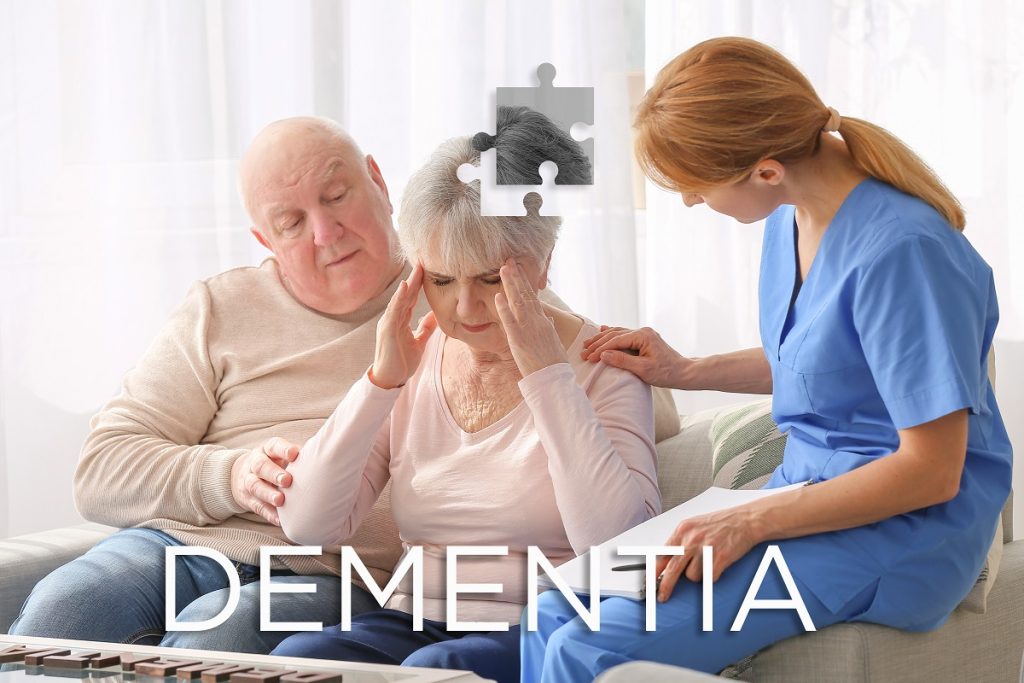Dementia is often marked by depression, confusion, and memory loss. These changes are often permanent and change the course of a person’s life. However, there are some reversible conditions that are often mistaken for dementia. Proper diagnosis can get the patient on the road to treatment.
Even today, there is no known cure for Alzheimer’s and other types of dementia. However, some medical conditions may cause cognitive decline, and treating those can reverse dementia-like symptoms. According to studies, up to 23% of dementia cases arise because of “potentially reversible causes.”
What Are The Symptoms Of Dementia?
People with dementia demonstrate impairments in their cognitive function. Caregivers can attest that the decline in their thinking, remembering, reasoning, and communication skills is so significant that it interferes with their daily affairs.

The common symptoms of dementia are:
- Memory loss
- Poor judgment
- Confusion
- Difficulty speaking and understanding thoughts
- Inability to perform activities of daily living
- Decreased focus
- Personality changes and depression
What Is The Difference Between Dementia And Alzheimer’s?
Alzheimer’s disease is the most common form of dementia and is more prevalent among older people. Per the Alzheimer’s Association, most Alzheimer’s patients are at least 65 years old.
It’s a disorder caused by complex brain changes. It first affects the part of the brain responsible for learning; it’s why the earliest symptoms include difficulty recalling things and learning new information.
Dementia, on the other hand, isn’t a specific disease. Instead, it’s a general term that comprises brain disorders marked by cognitive impairment. The areas affected and the underlying cause can differ from that of Alzheimer’s. Other dementia disorders are:
- Vascular dementia
- Lewy Body dementia
- Frontotemporal dementia
- Parkinson’s disease dementia
- Mixed dementia
What Are Some Of The Common Causes Of Dementia?
Dementia is a common concern in geriatric care as aging is one of the risk factors for developing a brain disorder that falls under this umbrella term. Family history, poor heart health, and having a head injury can also increase one’s likelihood.
Dementia leads to the death of brain cells (neurons) and loss of brain tissue throughout the brain. Causes — including those that can be reversed — are:
- Disruptions in cerebrospinal fluid (CSF). CSF plays a vital role in the nervous system: it cushions the brain and spinal cord and protects against injury while helping provide nutrients. CSF disruptions during aging can contribute to Alzheimer’s disease.
- Vitamin B12 (folate) deficiency. Folate is involved in the protein metabolic capacity of every cell in the body — including those in the brain. The lack of this vitamin can cause memory loss, lethargy, and depression.
- Medication side effects. Antidepressants and antianxiety drugs like benzodiazepines, while beneficial in addressing certain conditions, can bring forth unwanted side effects like confusion and memory problems.
- Sleep apnea and other sleep deficits. When one’s sleeping patterns are disturbed, it can lead to a decrease in cognitive performance. In particular, sleep apnea can cause hypoxia (lack of oxygen) in neurons.

- Alcohol abuse. An estimated 10% of early-onset dementia is alcohol-related. Chronic alcohol intake can wreak havoc on the brain, cause neurotoxic damage, and promote nutritional deficiencies.
- Brain tumors. Tumors or abnormal brain tissue growth can affect memory, judgment, and impulse control.
What Conditions Can Be Mistaken For Dementia?
Here are some of the medical conditions that mimic dementia.
Depression
Major depressive disorder — the chronic feeling of intense sadness — is the most common potentially reversible dementia-like condition. If someone is clinically depressed, they will exhibit low mood, loss of interest and concentration, and disturbed sleep. Among older people, depression can cause memory impairment and disorientation.
As stated, some antidepressants can also cause signs similar to dementia.
Additionally, there are cases when a patient has both depression and dementia, but the former tends to appear first before the latter develops.
Thyroid Issues
Both hypothyroidism and hyperthyroidism and hyperthyroidism can lead to memory dysfunction and depression. The former is a condition where the thyroid gland produces low levels of thyroid hormones, while the latter shows excessive thyroid hormone levels.
People with thyroid problems can also experience brain fog and decreased concentration. These signs are similar to Alzheimer’s and other types of dementia.
Other hormone-related conditions that can cause dementia-like symptoms include hypopituitarism (underactive pituitary gland), porphyria (lack of haem, an iron-containing compound), and Cushing’s syndrome (too much cortisol hormones).

Normal Pressure Hydrocephalus (NPH)
NPH is a neurological disorder marked by impaired bladder control, walking abnormalities, and dementia-like symptoms (e.g., lack of attention and focus, loss of motor control, and loss of complex cognitive function).
About 700,000 Americans suffer from this hard-to-diagnose condition because it resembles other brain diseases. It can be caused by the weakening of veins, which may disrupt the flow of CSF, and the swelling of white matter, which affects blood flow to certain brain areas.
Urinary Tract Infections (UTI)
UTIs are common among women and the elderly. It happens when bacteria enter the urinary tract through the urethra. When left untreated, it can infect the bladder and the kidney.
While frequent urination and blood in the urine are common signs, UTI can cause increased agitation, confusion, and even withdrawal.

Brain-Related Infections
Infections such as meningitis (inflammation of membranes protecting the brain and the spinal cord) and encephalitis (inflammation of the brain) can affect different brain functions. Patients with this condition can have memory issues, speech and language problems, personality changes, and confusion.
There are also cases of dementia that originate from such infections.
What Are Some Of The Signs And Symptoms Of These Conditions?
Dementia is often tricky to spot. Clinicians sometimes misdiagnose it because other conditions mimic dementia. A neurologist must perform brain imaging, blood and urine tests, and psychological assessments, among others, to rule out diseases whose symptoms intersect with the common signs of dementia.
These symptoms include:
- Delirium or a change in mental state
- Disorientation and confusion
- Memory loss
- Irritability
- Mental slowness
Reversible Conditions Mistaken For Dementia
Many people ask if there is reversible dementia. The most common types of dementia – including Alzheimer’s, vascular, Lewy Body, and frontotemporal — are still irreversible and incurable.
However, there are reversible conditions that masquerade as dementia because of their dementia-like cognitive symptoms. They can be treated as long as the underlying cause is appropriately identified.
The dementia symptoms tied to other systemic diseases, nutritional, endocrine, or psychiatric disorders, and substance abuse, for example, are often reversible in someone under 65. Researchers have found that more than 18% of dementias are reversible in the younger group but only 5% in the older population.
Will All Dementia-Like Symptoms Go Away When The Condition Is Treated?
If your loved one has reversible dementia-like conditions, the symptoms can go away, or at least be stabilized, once the cause is determined and addressed.
A physician who suspects other causes for dementia-like symptoms might order tests such as:
- Chest radiography
- Complete blood cell count
- Electrocardiography
- Erythrocyte sedimentation rate
- Liver/renal function tests
- Serologic tests for syphilis (or similar)
- Serum electrolyte levels
- Serum Vitamin B
- Thyroid function tests
- Urinalysis and microscopy
The doctor may find other causes for symptoms. For these treatable conditions, treatment plans may include medications, supplements, lifestyle changes, and surgical procedures (as in the case of NPH), among others.

